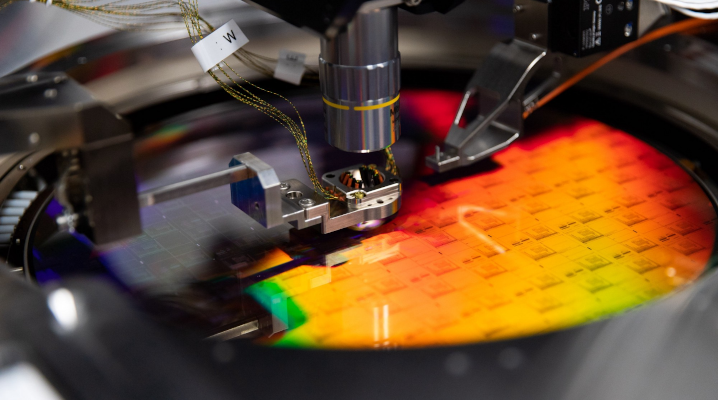 EMERGING TECH
EMERGING TECH
 EMERGING TECH
EMERGING TECH
 EMERGING TECH
EMERGING TECH
PsiQuantum Inc. today said that it has nabbed a $450 million late-stage funding round led by investment firm BlackRock Inc. to finance its efforts to build a reliable quantum computer with more than a million qubits.
Qubits are the quantum equivalent of the bits in regular computers. What sets a qubit apart is that it can perform two calculations at the same time, that is instantly. As more qubits are added to a quantum computer, the number of computations that the system can perform instantly grows at an exponential rate. Researchers hope that building a sufficiently large quantum computer would make it possible to perform complex scientific calculations too advanced for even the fastest supercomputers in existence today.
But there are still major technical hurdles standing in the way of that vision. Palo Alto, California-based PsiQuantum is one of several startups working to overcome those technical hurdles.
Thanks to its latest capital raise, PsiQuantum also one of the best-funded. The $450 million Series D funding round represents more than half of the approximately $780 million in total funding that quantum computing startups raised last year, according to market research cited by the Wall Street Journal. The funding round values PsiQuantum at $3.15 billion.
PsiQuantum’s approach to building quantum computers centers on the idea of using photons, that is light, as qubits. It hopes to generate those photon-powered qubits using chips made with standard semiconductor manufacturing processes.
The startup publicized a technical overview of its technology after its previous funding round last year.
The observation that as more qubits are added to a quantum computer, the number of calculations that can be performed instantly grows at an exponential rate is the result of a quantum mechanical phenomenon known as entanglement. This phenomenon occurs when two qubits, which in this case are photons, are locked into an identical physical state. PsiQuantum is developing a quantum chip that generates entangled qubits with the help of numerous tiny onboard mirrors.
One of the main challenges that has to be solved before large-scale quantum computers can be built relates to error correction. Qubits frequently lose the data they process, to the point that it’s currently impossible to reliably carry out complex calculations. As a result, PsiQuantum and its rivals are focusing a sizable portion of their resources on developing technologies to mitigate qubit errors.
PsiQuantum is tackling the challenge in several ways. One approach it’s pursuing involves dramatically increasing the number of qubits used for quantum computing. The startup has stated that its long-term goal is to build a quantum computer with about one million qubits, about 100 to 300 of which would be error-corrected and reliable enough to perform processing. Though a tiny fraction of the total, those qubits could potentially still be capable of performing complex calculations.
A computation in a quantum computer corresponds to a physical phenomenon that occurs on a qubit. For example, some types of quantum computers perform calculations by modifying the spin of their qubits. PsiQuantum’s chip carries out computations using other physical phenomena that it says are less to prone to errors than certain competing approaches.
The startup is already manufacturing early versions of its quantum chip. So far, PsiQuantum has produced chip wafers with tens of thousands of single photon sources and single photon detectors, the tiny components used to manipulate the light from which qubits are made. PsiQuantum is also developing auxiliary chip components such as circuits for managing the flow of data to and from qubits.
A key element of the startup’s approach is that its chip can be made using commercial semiconductor fabrication processes. This stands in contrast with many other types of quantum computers, which require more specialized manufacturing equipment to make. PsiQuantum argues that its approach makes large-scale manufacturing more practical.
“Quantum computing is the most profoundly world-changing technology uncovered to date,” said PsiQuantum co-founder and Chief Executive Officer Jeremy O’Brien. “It is my conviction that the way to bring this technology into reality is by using photonics. Our company was founded on the understanding that leveraging semiconductor manufacturing is the only way to deliver the million qubits that are known to be required for error correction, a prerequisite for commercially valuable quantum computing applications. This funding round is a major vote of confidence for that approach.”
Support our mission to keep content open and free by engaging with theCUBE community. Join theCUBE’s Alumni Trust Network, where technology leaders connect, share intelligence and create opportunities.
Founded by tech visionaries John Furrier and Dave Vellante, SiliconANGLE Media has built a dynamic ecosystem of industry-leading digital media brands that reach 15+ million elite tech professionals. Our new proprietary theCUBE AI Video Cloud is breaking ground in audience interaction, leveraging theCUBEai.com neural network to help technology companies make data-driven decisions and stay at the forefront of industry conversations.